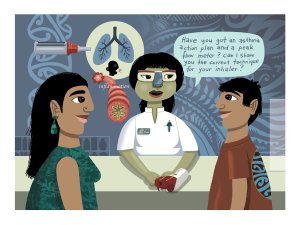Academic pharmacist Nataly Martini discusses the medical management of asthma in adults and adolescents, which has evolved to prioritise early anti-inflammatory treatment. She also explains how to improve patient outcomes by proactively identifying poor asthma control and supporting equitable access to education and treatment
Te Whatu Ora to offer 5 per cent funding boost
Te Whatu Ora to offer 5 per cent funding boost

Te Whatu Ora is planning to offer pharmacy owners 5 per cent more funding this year. Jonathan Chilton-Towle gauges reaction
Community pharmacy owners say the 5 per cent funding increase offered by Te Whatu Ora ahead of contract negotiations is nowhere near enough.
The planned offer was revealed in a letter sent to pharmacy representatives involved with the National Annual Agreement Review before the group’s first meeting on 24 May.
Alex de Roo, co-owner of Unichem Parkside in Christchurch, Life Pharmacy in Rangiora and Parkside Pharmacy on Oxford Terrace in Auckland, says the 5 per cent offer is disappointing.
Mr de Roo is attending the NAAR on behalf of the Christchurch Community Pharmacy Group, which represents 31 contract holders, and will be discussing the offer with the other members.
“I would imagine that most of them won’t be happy,” he says.
Owners are faced with skyrocketing wage costs; many are seeing rents increase and other costs have increased by much more than 5 per cent.
“It’s really disappointing that our main funding stream is not going to meet what we need.”
It is unclear what the offered increase will apply to, as Te Whatu Ora’s letter did not say if it would be just an increase to the Additional Professional Advisory Services fee or across all pharmacy service lines.
“They’ve announced it with very little detail, which makes it hard to provide comment on, which seems to be pretty standard for where we’re at at the moment.”
He has criticised Te Whatu Ora in the past for coming to NAAR at the first meeting with a take-it-or-leave-it-offer and says the health ministry appears to be taking the same approach this year.
Diane Boyle, the owner of Aramoho Pharmacy in Whanganui, says a 5 per cent increase is far from enough and believes it has gotten to the point where pharmacy owners need to collectively strike to make their concerns heard.
“The reality is my staff need pay rises, and I can’t give them the sort of pay rises they need with a 5 per cent increase,” Ms Boyle says.
“I think we need to go on strike because the health groups that go on strike seem to be the ones that get the most funding.”
She says pharmacies are losing staff over the pay issue, and pharmacies like hers cannot afford to pay the wages being asked for.
Ms Boyle believes pharmacy urgently needs funding increases comparable with those recently received by nurses, teachers and firefighters and that the boost should be about 20 per cent.
She says the sector has been underfunded for years, as the formula used to calculate how pharmacies are paid since 2012 was seriously flawed.
She claims that payments for dispensing do not cover the full cost pharmacies pay to supply drugs and for every drug that costs more than $18, pharmacies pay 7 per cent of the cost of dispensing it.
“There are some pretty high-priced drugs that go out in large quantities, such as insulin and the new inhalers, that pharmacies pay 7 per cent towards every time, and I don’t think that’s right. I think we should be paid the full cost of the meds, including the markup from the wholesalers.”
Clive Cannons, the owner of Clive’s Chemist in Wainuiomata, Wellington, says 5 per cent is “better than nothing, but that’s all you can say about it.”
He says simply giving a percentage funding increase each year does not address the underlying issues with the pharmacy funding model that mean many pharmacy services, including dispensing, are seriously underfunded.
“We have to have a conversation about whether fees for service are actually fulfilling the health objectives of Te Whatu Ora and serving our communities in the best possible way. I believe they are not.”
Ian McMichael, the co-owner of Pharmacy 547 in Hamilton, believes pharmacy representatives at NAAR should accept the 5 per cent offer but get an agreement that if the doctor representatives manage to negotiate a higher percentage funding increase at the upcoming PHO Services Agreement Amendment Protocol, then Te Whatu Ora will match this for pharmacy.
Mr McMichael thinks NAAR should be used to address the many other issues affecting pharmacy.
He wants to put the focus on pharmacies being underpaid for additional services they offer, such as clozapine, warfarin management and methadone.
Mr McMichael says Te Whatu Ora’s planned $25 plus GST per patient consultation fee for the upcoming minor ailments scheme should be viewed as a benchmark for service fees, and any time pharmacies are paid less than this, they are being underpaid.
He also wants a statement from Te Whatu Ora acknowledging that dispensing is an extremely clinically important part of the health system and the creation of a high-level productivity committee that has the power to remove the barriers creating inefficiency in pharmacy processes.
Pharmacy Guild chief executive Andrew Gaudin says the guild has developed a prioritised list of issues for discussion during this year’s NAAR process on behalf of members and sought endorsement of this list from members. Mr Gaudin did not elaborate on what the issues are.
“We will keep members updated as negotiations progress. Funding, including recognition of cost pressures, will be a key part of negotiations,” he says in an emailed statement.








